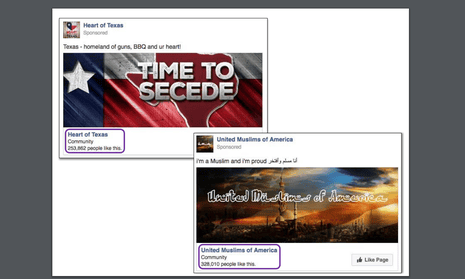Senators from both parties warned of the role of Russian misinformation on Wednesday in a hearing on the Kremlin’s meddling in the 2016 election.
Questioning executives from Twitter, Google and Facebook, members of the Senate intelligence committee warned of the influence of “fake news” and bots on the campaign and how Russia “conducted an information operation intended to divide our society along issues like race, immigration and second amendment rights” in the words of the committee’s chair, Richard Burr of North Carolina.
However, there were partisan divides in how the concern was phrased. Burr attempted to minimize the influence of Russian-linked Facebook ads in determining the result of the 2016 election, while Mark Warner, the committee’s vice-chair, explicitly criticized the Trump administration’s approach to this issue.
“We have a president who remains unwilling to acknowledge the threat that Russia poses to our democracy,” said the Virginia Democrat. “President Trump should stop actively delegitimizing American journalism and acknowledge and address this real threat posed by Russian propaganda.”
Warner also raised concern about the sheer scope of misinformation on social media. He said in his opening statement that, in addition to the 80,000 Russian-backed posts on Facebook that reached 126 million Americans during the 2016 campaign, there were potentially 120,000 similar posts on Instagram and that up to 15% of Twitter accounts are “fake or automated. An executive for Facebook conceded that starting from October 2016, just before the election, the Russian posts on Instagram reached an additional 16 million Americans.”
Warner went on to attack the tech companies testifying, telling them that members of the committee “were frankly blown off by the leadership of your companies, and dismissed” when they initially raised concerns. All three tech executives said their internal investigations were continuing and that they had yet to determine the full scope of Russian interference.
Warner’s outrage was shared by other members, including Democrat Dianne Feinstein of California, who explicitly told the tech executives, “I don’t think you get it” and described Russian interference as “the beginning of cyberwarfare”.
In questioning, Burr displayed two ads from Russian-created Facebook pages, one from a group called “Heart of Texas” and the second from a group called “United Muslims of America” that pushed divisive contact. In particular, he noted that both groups created events at the same time and location in Houston, Texas, in an attempt to spark conflict in 2016.
The questioning also touched on other issues. Facebook executive Colin Stretch conceded that his network had blocked a profile of Chinese dissident Guo Wengui after the Chinese government had reported it to them. Wengui, who lives in the United States, had used his account to expose corruption within China, where Facebook is banned.
Later in the day, the House intelligence committee held a hearing on the same topic. The hearing included the release of a number of Facebook ads used by Russia during the 2016 election and the concession from Stretch that Facebook did “have an obligation to prevent foreign interference in the election” and that foreign interference represented “an existential threat to our democracy”.
The South Carolina Republican Trey Gowdy berated the executives over fake news. “For the life of me, I do not understand how a republic is served by provably intentionally false information,” said Gowdy. “And I get it that you don’t want to be the arbiter of opinion. I don’t want you to be, either. But today is not Thursday. So if I say it is, I swear I don’t understand how my fellow citizens benefit from me telling them something that is demonstrably false and saying it with the intent to deceive. For the life of me, I don’t get it.”
However, his colleague Chris Stewart, of Utah, claimed “fake news is in the eye of the beholder” and defended a story run on the conspiracy-theory-peddling website Infowars.
The Senate intelligence committee’s hearing came a day after the Senate judiciary committee held a similar session on Russian use of social media to influence and interfere in the 2016 election.
